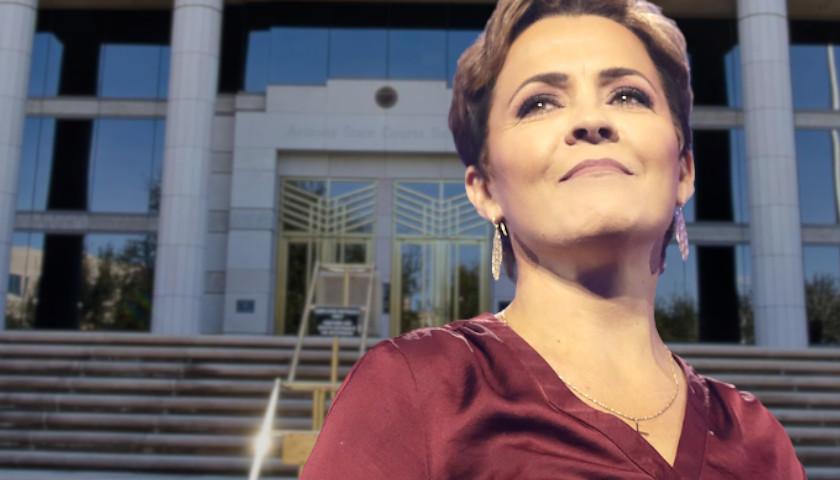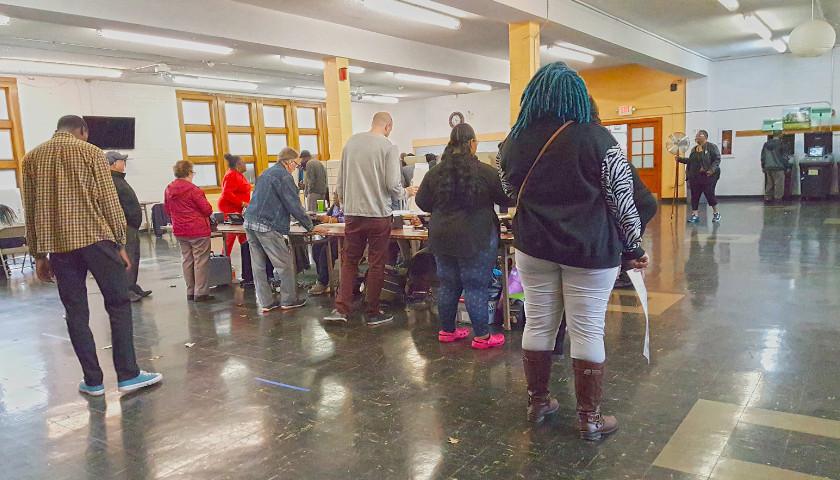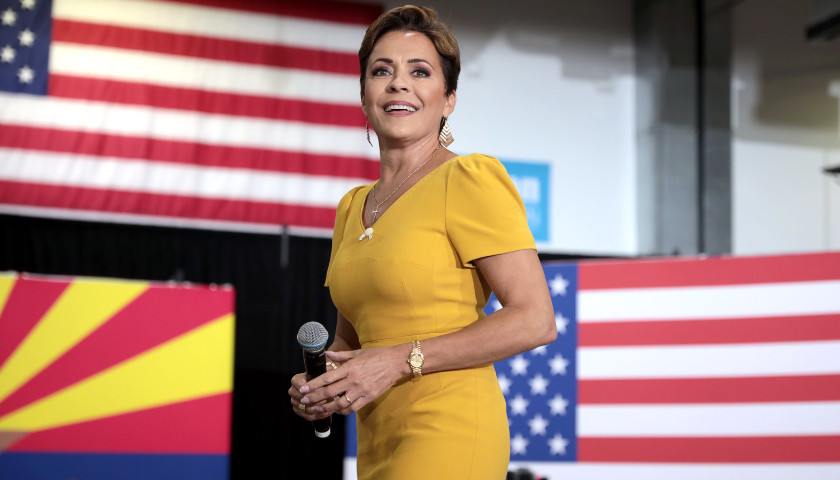Kari Lake filed a Notice of Appeal in May with the Arizona Court of Appeals after a trial court judge ruled against her election challenge in a remanded trial. However, due to new circumstances, she is now asking the Arizona Supreme Court to bypass the appeals court and take the case instead.
Her Petition for Transfer states that there is “extraordinary new evidence” the court should also take the appeal due to “this case’s statewide importance, and the urgency of remedying election maladministration affecting the 2022 election and the upcoming 2024 election.”
Lake originally attempted to get the trial court judge, Maricopa County Superior Court Judge Peter Thompson, to consider the new evidence when he conducted the second trial by filing a Rule 60(B) motion requesting the inclusion of it, but he denied the request. Instead, Thompson only allowed the trial to consider the issue remanded by the Arizona Supreme Court after it reversed his signature verification standards.
The “explosive new evidence” Lake’s team provided was that “Maricopa falsely certified that it successfully completed logic and accuracy (‘L&A’) testing on October 11, 2022 in accordance with A.R.S. §16-449, including all 446 tabulators used at Maricopa’s 223 vote centers.”
Lake’s brief argued that the testing took place after officials claimed it had been done and that they discovered the same types of printing issues that took place on Election Day.
“Maricopa conducted unannounced testing of all 446 vote center tabulators on October 14, 17, and 18,” the brief said. “Maricopa’s tabulator system log files show that 260 tabulators (i.e., 58%) rejected ballots with the same tabulator error codes that recurred on Election Day.”
She accused the county, “This suggests Maricopa’s unannounced and unlawful testing may have been a dry run for the Election Day debacle.”
According to Lake’s team, the county swapped out the memory cards and election software on the 446 vote center tabulators. It replaced them with “reformatted” cards but did not perform the statutorily required testing on them after doing so and did not admit it had been done until seven months later in response to a motion by Lake.
The brief reiterated the findings from Maricopa County’s expert who looked into the printing problems, former Arizona Supreme Court Justice Ruth McGregor. She found that “four printers randomly printed one or a few ‘fit to page’ ballots in the middle of printing a batch of ballots…[n]one of the technical people with whom we spoke could explain how or why that error occurred.” McGregor said she could not determine whether a printer technician caused the problem or if it was internal to the printers.
The brief added, “Lake’s expert testified this ‘error’ could only result from malware or remote access and resulted in at least 8,000 misconfigured ballots, the vast majority of which were neither duplicated nor counted.”
Lake pointed out that Scott Jarrett, Maricopa County co-director of Elections, “falsely testified” that the printing problems only occurred at three vote centers. Instead, “new evidence” shows that “misconfigured ‘fit-to-page’ ballots occurred at 127 vote centers on Election Day,” with 7,000 ballots rejected every 30 minutes all day long.
Other new evidence Lake’s team said recently arose was discovered by analyzing “30+ million log entries,” which revealed that “the reformatted memory cards failed to match the election domain — which Maricopa did not correct.” The team also found that the tabulator settings, which govern how the tabulators interpret ballots, were programmed with the wrong software version.
Lake’s team said it found out that the version of Dominion tabulator software used during the election was not authorized by the secretary of state, violating A.R.S. 16-442. The brief concluded about those discoveries, “The foregoing faults means there is no way to know if the votes cast or tabulated were correctly recorded.”
A second major issue the brief argued that should warrant the Arizona Supreme Court’s consideration was the “humanly impossible speeds” of signature verification. Lake’s signature expert testified during the second trial that it was impossible to compare signatures in accordance with A.R.S. 16-550(A) within two or three seconds.
“More than 70,000 voter signatures were supposedly ‘compared’ and ‘verified’ in under two seconds each, and more than 276,000 signatures took less than three seconds each,” the brief stated.
The brief argued that three reasons justify extraordinary circumstances necessitating transfer to the Arizona Supreme Court. First, Thompson’s denial of the Rule 60(B) motion and his ruling on the signature verification. Second, “the cloud over the 2022 election must be resolved to restore faith in that and future Arizona elections.” Finally, “these issues are obviously of statewide importance.”
Lake’s brief pointed out that Thompson denied the Rule 60(B) motion in part because he claimed that she “switched her claim from a ‘printer-based claim’ to a ‘tabulator-based claim,’” which did not constitute new evidence but was merely a new claim so not allowable. This isn’t accurate, Lake’s team argued, since “Count II has always centered on the Election Day tabulation chaos caused by misconfigured and defective ballots and Maricopa’s failure to perform proper L&A testing, which would have detected these issues.”
Thee brief pushed back against Thompson’s findings that Rule 60(B) requires a showing of “fraud” or “misrepresentation.” The “new evidence contradicts Jarrett’s testimony about the cause and scale of tabulation ballot rejections.” The brief cited case law which holds that relief from judgment can be granted for “accidental omissions,” not just fraud or misrepresentation.
Lake’s brief challenged Thompson’s assertion that “the statutory requirement of what it means to ‘compare’ voter signatures under A.R.S. § 16-550(A) is not judicially reviewable.”
The Arizona Republican’s team argued that interpreting the law in that dismissive way would “leav[e] Arizona voters with no remedy” and “contradict long-standing precedent,” citing case law which provides that “the words of a statute are to be given their ordinary meaning unless it appears from the context or otherwise that a different meaning is intended.”
– – –
Rachel Alexander is a reporter at The Arizona Sun Times and The Star News Network. Follow Rachel on Twitter. Email tips to [email protected].
Photo “Kari Lake” by Gage Skidmore. CC BY-SA 2.0. Background Photo “Arizona Supreme Court” by davidpinter. CC BY 3.0.





